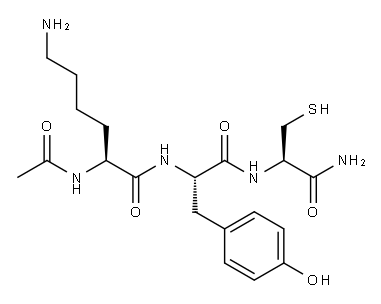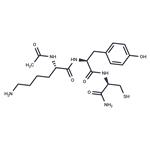Description
N-acetyl lysyltyrosylcysteine amide: an effective inhibitor of Myeloperoxidase activity
N-Acetyl lysyltyrosylcysteine amide is a potent, reversible, specific, and non-toxic tripeptide inhibitor of myeloperoxidase (MPO). This amide effectively inhibits the MPO generation of toxic oxidants in vivo. It reduces neuronal damage and preserves brain tissue and neurological function in the stroked brain. N-Acetyl lysyltyrosylcysteine amide inhibits MPO-dependent hypochlorous acid (HOCl) generation, protein nitration, and LDL oxidation[1].
Cytotoxicity
BAECs (passages 4–10) were seeded onto 96-well plates and cultured in MEM medium containing 10% FBS in a 5% CO2 and 100% humidity environment at 37°C. Increasing concentrations of KYC (0 to 4 mM, final concentration) were added to the culture medium and cells were incubated for another 24 h. The MTS assay determined the effects of KYC on cell viability. Caspase activities for apoptosis in the treated BAECs were measured with the Homogeneous Caspases Assay kit from Roche. Necrosis and mitochondrial functions were analyzed by the Mitochondrial ToxGlo? Assay kit.
Based on data from these studies, we conclude that KYC does not induce cell damage even at concentrations up to 4,000 μM. Compared with the basal levels of caspase activity (in the group without KYC treatment), BAECs treated with high KYC concentrations tended to decrease caspase activity, which may indicate that KYC protects cells at high concentrations through its free thiol antioxidant properties. This may explain why protease activity decreased in BAEC cultures incubated with 4,000 μM KYC.
References
[1] Zhang, Hao et al. “N-acetyl lysyltyrosylcysteine amide inhibits myeloperoxidase, a novel tripeptide inhibitor.” Journal of lipid research vol. 54,11 (2013): 3016-29. doi:10.1194/jlr.M038273

